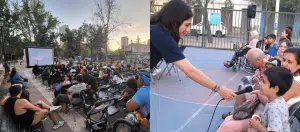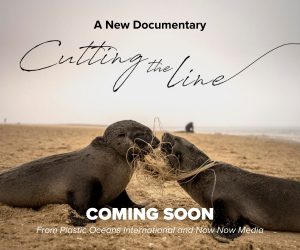Plastic Oceans International is committed to fostering sustainable communities worldwide with the primary aim of eradicating plastic pollution. It’s evident that plastic pollution is a complex, multifaceted issue that necessitates a change in how we function across every societal level, whether it be local, national, regional, or international. It involves a systematic flow of information across all these levels, enabling us to align our efforts effectively.
Unleashing the Power of Film
Film holds an undeniable power to educate and inspire change. We’ve all experienced the transformative effects of a film that has altered our perception, built emotional connections, or shed light on a new subject. However, simply watching a film doesn’t always translate to action or lead to meaningful solutions.
To address this gap, we have employed a unique method – the film-activism distribution model. This innovative approach supports the flow of information needed to bridge knowledge gaps while actively engaging local communities to create solutions that align with our global objectives. We firmly believe that achieving an end to global plastic pollution is contingent on executing solutions at the local level.

Plastic Oceans Europe organized a workshop and film screening followed by a community discussion and microplastic cleanup with students.
The Film-Activism Model Explained
Our model involves creating a comprehensive film library that address the complex issues of global plastic pollution. Instead of presenting a single perspective, we collaborate with community leaders worldwide to identify local knowledge gaps and hurdles to guide the expansion of our film library. The collaborative approach during the early stages of film production allows us to create content that directly addresses these gaps at a local level. It also allows filmmakers to better explore the nuanced context of the challenges faced.
Our film library offers a departure from traditional film distribution models that often limit the use of films due to rights control. Our model allows us to modularize a lengthy documentary into various formats suitable for different audience types and learning purposes, while consistently delivering the same valuable information.
The Rationale Behind Our Film-Activism Model
Statistics demonstrate that awareness of plastic pollution’s impacts alone does not necessarily drive change. For instance, between 2010 and 2020, there was a 40% increase in the number of environmental NGOs in the U.S. and a 60% increase in media coverage of plastic pollution. Still, plastic production and consumption increased by 31% during the same period, indicating a direct correlation to the rate of plastic pollution.
While there’s undoubtedly been a growth in awareness of plastic pollution’s harmful impacts and changes in personal behaviors, a disconnect remains. The flow of information and increased awareness has not successfully linked to tangible, actionable changes needed to tackle global plastic pollution significantly.
Our Film-Activism Model seeks to systematically bridge this disconnect, harnessing the power of film with localized engagement to convert awareness into actions that create substantial change in addressing plastic pollution worldwide.

Plastic Oceans Chile hosted film screenings and community dialogues in different neighbourhoods of Santiago during January, February and March this year to better understand their local barriers, necessities and solutions.
Trees & Seas Film-Activism Festival
Trees & Seas Film-Activism Festival is a Plastic Oceans led collaborative initiative that aims. To build a bridge between ocean and forest conservation through film-activism. Emphasizing that we are multiple communities that make-up one planet … one environment … and in the end. One global community united in our effort to foster a healthier and more just planet for all.
This global film-activism festival brings together local community activism and global education through film working with our global branches, BlueCommunities members and local partners around the world. Our mission is to end plastic pollution unifying community activism and shared global education through film. A global end to plastic pollution starts with local community awareness and execution.
Join the upcoming Trees & Seas Film-Activism Festival from September 1-10 by visiting our website HERE.
Here are 4 ways you can join the global movement:
- JOIN AN EVENT around the globe. View upcoming events on our Trees & Seas website.
- HOST AN EVENT in your community, such as a film screening, panel discussion, cleanup, tree planting and more! Visit the Trees & Seas website to register your event and get resources to plan your event. In our toolkit like event planning guides, educational material, templates to promote your event and more.
- ACT AS AN INDIVIDUAL by watching and sharing one of our films and festival details. Visit our website for the festival toolkit, including educational resources and more ways to join the movement!
- DONATE to our global movement to unite ocean and forest conservation around the world HERE.
Julie Andersen is the CEO and Founder of Plastic Oceans International. Julie’s Plastic Oceans work combines her career protecting human and environmental health, life sciences education and love for the ocean. She has worked in public health and nonprofit management. Internationally for the past 20 years, including the US, Japan, Hong Kong and Thailand.


